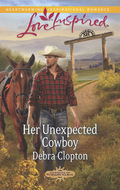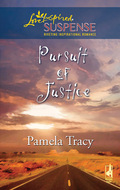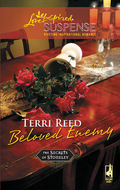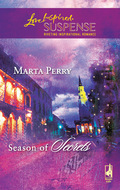Kitap dosya olarak indirilemez ancak uygulamamız üzerinden veya online olarak web sitemizden okunabilir.
Kitabı oku: «Sugar Plums for Dry Creek»
Lizette smiled. “I guess I could make doughnuts one of these days.”
Judd told himself that it was only his concern for the safety of the kids that made him worry about who was likely to be visiting the ballet school. He’d been in Dry Creek long enough to know about all the cowboys on the outlying ranches.
A woman like Lizette Baker was bound to attract enough attention without adding doughnuts to the equation.
Not that it should matter to him how many men gawked at the ballet teacher. He certainly wasn’t going to cause any awkwardness by being overly friendly himself. He was just hoping to get to know her a little better.
She was, after all, the kids’ teacher, and he was, for the time being, their parent. It was practically his civic duty to be friendly to her. And he didn’t need a doughnut to make him realize it.
JANET TRONSTAD
grew up on a small farm in central Montana. One of her favorite things to do was to visit her grandfather’s bookshelves, where he had a large collection of Zane Grey novels. She’s always loved a good story.
Today, Janet lives in Pasadena, California. In addition to writing novels, she researches and writes nonfiction magazine articles.
Sugar Plums for Dry Creek
Janet Tronstad

I can do all things through Christ
which strengtheneth me.
—Philippians 4:13
This book is dedicated to my grandfather, Harold Norris, who shared his love of a good book with me.
Dear Reader,
I hope you enjoyed reading about Judd and Lizette. When I was telling their story, I thought about what it feels like to go to a church for the first time. Their feelings of awkwardness are repeated many times each Sunday as someone visits a church and isn’t sure of what their welcome will be. During the Christmas season, you may see people in your church who do not seem to feel comfortable. Hopefully, you can help them feel like they are among friends.
May you have a blessed Christmas.

Contents
Chapter One
Chapter Two
Chapter Three
Chapter Four
Chapter Five
Chapter Six
Chapter Seven
Chapter Eight
Chapter Nine
Chapter Ten
Chapter Eleven
Chapter Twelve
Chapter Thirteen
Chapter Fourteen
Chapter Fifteen
Chapter Sixteen
Chapter Seventeen
Chapter Eighteen
Chapter Nineteen
Epilogue
Chapter One
Lizette Baker wished her mother had worried less about showing her the perfect way to pirouette and more about teaching her a few practical things, like how to coax more warm air out of her old car’s heating system and how to put snow chains on tires so smooth they slipped on every icy patch she found as she drove east on Interstate 94 in southern Montana.
A colder, frostier place Lizette had never seen. Even with a wool scarf wrapped around her neck and mittens on her hands, she couldn’t stay warm. It was only mid-November and it was already less than ten degrees Fahrenheit outside. No wonder hers was the only car in sight as she drove along this road hoping to reach Dry Creek, Montana, before her heater gave out completely.
The attendant in the gas station she’d stopped at back in Forsyth had offered to call a mechanic to repair her heater. Another man, with a dirty blond beard and a snake tattooed on his arm, had made a different suggestion.
“Why put out good money for a mechanic?” he’d asked in an artificially friendly voice. Lizette hadn’t liked the way he was looking at her. “I’ll keep you warm if you give me a ride down the road a bit. I’m looking for my kids.” He’d reached into his pocket and pulled out a worn snapshot, which he’d then shoved at her. “Kids need to see their old man. You haven’t seen them, have you?”
Lizette would have rather given the snake on the man’s arm a ride than the man himself, but she hadn’t wanted any trouble, so she’d politely looked at the picture of his two children.
“No, but they’re beautiful children.” And the children probably would have been beautiful, she thought, if they hadn’t looked so skinny and scared. “Sorry about the ride, but I have a car full of boxes. Moving, you know.”
Lizette hoped the man hadn’t looked at her car too closely. If she’d shifted the boxes around a little, she could have cleared enough room in the front seat for a passenger.
The tattooed man hadn’t said anything more, but he’d put the picture back in his pocket.
After a moment’s silence, the attendant had finally asked, “So do you want the mechanic to come over to fix that heater? He doesn’t keep regular hours, but he can get down here in fifteen minutes flat.”
Lizette had shaken her head. “Thanks though.”
She barely had enough money left to get her ballet school going; she couldn’t afford to fix anything that wasn’t actually falling off the car. The heater was spitting out just enough warm air to keep her from freezing to death, so it would have to do for now.
She’d looked out her rearview mirror as she’d pulled away from the gas station and had seen the man with the snake on his arm watching her leave.
It wasn’t the first time since she’d left Seattle that Lizette had wondered if she was making a mistake.
Her whole life had changed in the last few months though, and she needed a new beginning. Besides, where else could she get free rent to start her own business? Lizette had learned to be frugal from her mother, Jacqueline. Indeed, it had been Jacqueline who’d found the ad for free space.
Lizette had not known until recently that her mother had saved for years with the hope that they could open their own ballet school someday. When Lizette’s father had died, years ago, Jacqueline had given up the fledgling ballet school she and her husband had started and had taken a steady job in a bakery. At the time, Lizette had not realized the sacrifice her mother was making to keep them secure, probably because Jacqueline never complained about giving up the school. When she’d first tied on her bakery apron, she’d even managed to joke. She said she wished her husband could see her. He’d say she was really a Baker at last.
Her mother had made the job sound as though it was exactly what she wanted, and Lizette had believed her back then. Maybe that was because Lizette herself was happy. The bakery was a playground to her. She loved the warm smells and all of the chatter of customers. The bakers even got into the habit of asking Lizette to try out their new recipes. They said she had a taste for what the customers would like.
Giving up that ballet school was only one of the many sacrifices Jacqueline Baker had made for Lizette over the years. Lizette hadn’t even known about some of them until her mother had been diagnosed with terminal cancer. That’s when she’d started giving instructions to Lizette.
“You’ll find fifteen thousand dollars in this safety deposit box,” Jacqueline told her as she handed Lizette a key. “I wanted it to be more, but it’ll get that school of ours started if we’re careful. Then there’ll be no need for you to work at the bakery—you’ll be free to dance. The money should cover everything for a year. We don’t need anything expensive—just something with good floors and lots of room for practice.”
Lizette was amazed and touched. So that was why her mother’d never spent much money on herself, not even after she became the manager of the bakery and started earning a better salary. Lizette could see how important it was to her mother to start what she was calling the Baker School of Ballet.
As the pain increased and Jacqueline went into the hospital, she talked more and more about the school. She worried that Lizette had not been able to find an affordable space to rent even though she’d gone out to look at several places. Jacqueline even asked the hospital chaplain to come and pray about it.
Lizette was surprised her mother was interested in praying. Jacqueline had shown little use for God over the years, saying she could not understand a God who took a man away in his prime. Unspoken was the complaint that He had also robbed her of her beloved ballet school at the same time.
But now, at the end, who did her mother want to talk to? The chaplain.
If they hadn’t been in a hospital when her mother asked to speak to a minister, Lizette wouldn’t even have known how to find one. She herself had never been to church in her life. Sunday was the one day she could spend with her mother, and Jacqueline made it clear she didn’t want to go to church, so Lizette never even suggested it.
Yet on her deathbed Lizette’s mother spent hours talking to the chaplain about her hopes for a ballet school. Lizette quietly apologized to the man one afternoon when the two of them had left the room so the nurse could give Jacqueline an injection. Lizette knew the chaplain was a busy man, and she doubted he was interested in ballet schools—especially ones that didn’t even exist except in a dying woman’s dreams.
The chaplain waved Lizette’s apology aside, “Your mother’s talking about her life when she talks about that school. That’s what I’m here for. It’s important.”
In the last days, the soft sound of the chaplain’s praying was all that quieted Jacqueline. Well, Lizette acknowledged, toward the end it was also those expensive injections that kept her mother comfortable. Lizette never did tell Jacqueline that those injections weren’t covered by their insurance plan.
It didn’t take much money to open a ballet school, Lizette told herself when her mother kept asking about sites. By then, the extra hospital bills had used up the entire fifteen thousand dollars, and Lizette’s small savings account as well. Lizette said a prayer of her own when she promised to open the school in the fall.
“You’re right. Fall is the best time of the year to start a ballet school,” Jacqueline said as she lay in her hospital bed. “We can start our students right out on our simplified version of the Nutcracker ballet, and they’ll be hooked. Every young girl wants to be Clara. Plus we already have all of those costumes we made for you and the other girls when you were in dance school.”
Part of the deal in the sale of her parents’ ballet school had been that the new owner, Madame Aprele, would give Lizette free lessons. Lizette had studied ballet for years, and even though she didn’t have her mother’s natural grace, she still did very well.
“And you’ll be there to watch.” Lizette dreamed a little dream of her own. “You’ve always loved the Nutcracker.”
Her mother smiled. “I can almost see it now. I remember the first time I danced Clara as a five-year-old. And later, the Sugar Plum Fairy. What I wouldn’t give to dance it all again!”
Lizette vowed she’d find a way to open a school even without money. Then maybe her mother would get stronger and they could run that school together. With all of the praying the chaplain was doing, Lizette figured they were due a miracle.
Later that week Jacqueline claimed she’d found a miracle—right in the middle of the classified section of The Seattle Times. The ad offering free rent for new businesses had been buried in the used furniture section of the paper. Lizette called the phone number from the hospital room so her mother could listen to her end of the conversation.
Free rent would solve all of their problems for the school, and Lizette wanted Jacqueline to share the excitement of the phone call. Lizette hadn’t realized until she was halfway through the conversation that the free rent was in a small town in Montana.
Jacqueline kept nodding at her during the conversation, so Lizette found herself agreeing to take the town of Dry Creek up on their offer. She couldn’t disappoint her mother by telling her that the free rent wasn’t in Seattle.
Of course, Lizette had no intention of actually going to Dry Creek, Montana. She knew nothing about the place. Something about the phone call calmed Jacqueline, however, and she seemed truly satisfied. The chaplain said she made her peace with God the next afternoon. After that, nothing Lizette did could stop her mother from slipping away.
After Jacqueline was gone, Lizette remembered the small town in Montana. Seattle seemed the emptiest city in the world without her mother. Lizette couldn’t stay at the bakery, even though she’d worked there for the past six years. Lizette enjoyed the job, but she knew her mother would have scolded her for hiding away there.
Besides baking, the only other skill Lizette had was her expertise in ballet and there were no jobs for young ballet teachers in Seattle. Oh, Madame Aprele offered her a job, but Lizette knew the small school didn’t need another teacher, and she wasn’t desperate enough to take charity.
No, she had to go somewhere else, and she didn’t much care where.
So, here she was—moving to Dry Creek, Montana, and all because of a phone conversation with an old man and an offer of free rent. Lizette wasn’t sure the school would work. A small town in eastern Montana wasn’t the place she would have chosen to open the Baker School of Ballet.
Not that it was absolutely the worst place to start, Lizette assured herself. So few people appreciated ballet these days, and it gladdened her heart to remember the enthusiasm in the old man’s voice when she had called in response to the ad. The man she’d talked to on the phone was gruff, and she couldn’t always hear him because of the static, but he seemed excited that she was taking the town up on their offer of six months’ free rent. He kept talking about how large the area was that they could set aside for her.
The old man had mentioned tables and chairs and counters, so he might not be too familiar with ballet, but Lizette wouldn’t let that discourage her. It was the enthusiasm in his heart that counted. She’d be happy to educate this little town on the finer points of ballet.
Lizette was going to go ahead with a modified Nutcracker ballet. Her mother had been right that it was a great way to start. Lizette decided she would even make Sugar Plum pastries for a little reception after the performance. Stuffed with dried plums and vanilla custard, they were a Christmas favorite with many of the customers at the bakery.
The people of Dry Creek would like them as well.
Yes, Lizette thought to herself. A little music, a little ballet and a cream-filled pastry—the people of Dry Creek would be glad she’d opened her school in their town.
Chapter Two
Judd Bowman was standing at the back of the hardware store in Dry Creek counting nails. He figured he needed about fifty nails, but every time he got to thirty or so, one of the kids would interrupt him because they had to go to the bathroom or they wanted a drink of water or they thought they heard a kitten meowing. Judd sighed. Trying to take care of a six-year-old boy and a five-year-old girl was no picnic. Fortunately, the hardware store had a heater going, and it took the edge off the cold.
“Just sit down until I finish,” Judd said when he felt Amanda’s arm brush against his leg. He’d gotten to thirty-seven, and he repeated the number to himself. He knew the kids needed reassurance, so he tried to speak two sentences when one would have done him fine. “I won’t be long and then we can go over to the café and have some cocoa. You like cocoa, don’t you?”
Judd felt Amanda nod against his knee. He looked over to see that Bobby was still drawing a picture on the piece of paper that the man who ran the hardware store had given him earlier.
Amanda seemed to squeeze even closer to his knee, and Judd looked down. She was pale and clutching his pant leg in earnest now as she stared around his leg at the men in the middle of the hardware store.
Judd looked over at them, wondering what had stirred up the old men who sat around the potbellied stove. Usually, when he came into the store, the men were dozing quietly in their chairs around the fire or playing a slow game of chess.
Today, with the cold seeping into the store, the fire was almost out. There was wood in the basket nearby, so there was no excuse for anyone not to put another log in the stove.
But the men weren’t paying any attention to the cold or the fire.
Instead, they were all looking out the window of the hardware store and across the street into the window of what had been an old abandoned store that stood next to the café. The store wasn’t abandoned any longer. Judd could see the woman as she tried to hang what looked like a sign on the inside of her window.
Judd didn’t usually pay much attention to women, but he’d have remembered this one if he’d seen her before. She was tall and graceful, with her black hair twisted into a knot on the top of head. He could see why men would be looking at her.
“They’re just talking,” Judd said as he rested his hand on Amanda’s shoulder.
Judd had little use for idle conversation, but even he had heard a week ago that a new woman was moving to town. Several months ago the town had placed an ad in The Seattle Times inviting businesses to move to Dry Creek. The town had sweetened the deal by offering six months of free rent. Even at that, the woman was the only one to actually agree to come, so the town had given her the best of the old buildings they owned.
Judd squeezed Amanda’s shoulder as Bobby walked over to stand beside them as well. The boy had become attuned to his sister’s moods, and it never took him long to know when Amanda was frightened.
Judd spoke softly. “They’re just talking about the new woman who moved here.”
“Remember I told you about her?” Bobby added as he leaned down to look his sister in the eye. “She’s going to make doughnuts.”
“I’m not sure about the doughnuts,” Judd said. He worked hard to keep his voice even. Amanda picked up too easily on the emotion in men’s voices, and even though Judd was angry at the man who had made her so sensitive and not at her, he knew she’d think he was upset with her if he let his voice be anything but neutral.
Getting involved in the problems of Dry Creek was the last thing Judd wanted to do, but if that’s what it took to help Amanda realize all anger wasn’t directed at her, then that’s what he’d have to do. “Let’s go see what it’s all about.”
Judd walked slowly enough so Amanda could keep her fingers wrapped around his leg. She had her other hand in Bobby’s small hand.
“How’s it going?” Judd asked when they arrived at the group around the stove.
Judd had seen these men a dozen times since he’d rented the Jenkins farm this past spring, but he’d been so busy all summer with farm work and then with the kids that this was the first time he’d done more than nod in their direction.
Fortunately, the men were all too steamed up to wonder why he chose to talk now.
“Charley here is going deaf,” Jacob muttered as he leaned back with his fingers in his suspenders.
“I am not,” Charley said as he looked up at Judd through his bifocals. “I had a bad connection on that new fangled cell phone. Don’t know what’s wrong with it. Some of the words don’t come through too clear.”
“That’s when you ask the person to repeat themselves,” Jacob said.
The two men had obviously had this conversation before.
“I was being friendly,” Charley protested as he stood up and looked straight at Judd. “Everyone kept telling me to be friendly if anyone called. Now, do you think it sounds friendly to keep asking someone to repeat what they’ve just said?”
“Well, I guess that depends.” Judd hesitated. He didn’t want to get involved in the argument. He just wanted Amanda to hear that it wasn’t about her.
“You know, I got that phone because everybody said people would be calling about the ad at all times of the night and day,” Charley complained as he sat back down. “I even carried it to bed with me. And this is the thanks I get.”
“So you’re all angry because of the phone.” Judd nodded. There. That should satisfy Amanda that the argument had nothing to do with her.
“It isn’t the phone,” Jacob said as he shook his head. “It’s what he was supposed to do with the phone. He was supposed to make sure that businesses were suitable for Dry Creek.”
“He said she was a baker!” another old man protested.
“I had my mouth all set for a doughnut,” Jacob admitted. “One of those long maple ones.”
“Well, she kept saying Baker,” Charley defended himself. “How was I supposed to know that was just her name? Dry Creek could use a good bakery.”
“But she’s not a baker. She runs a dance school!” Jacob protested.
“And that’s the problem?” Judd tried again. He could feel Amanda’s hold on his leg lessen. She was listening to the men.
“Of course that’s the problem,” Jacob continued. “She doesn’t even teach real dancing, like the stomp-and-holler stuff they have at the senior center up by Miles City. This here is ballet. Who around here wants to learn ballet? You have to wear tights.”
“Or a tutu,” another old man added. “Pink fluffy stuff.”
“It isn’t decent, if you ask me,” still another man muttered. “Don’t know where she’ll buy all that netting around here anyway.”
“The store here started carrying bug netting since the mosquitoes were so bad over the summer. They still have some left. Maybe she could use that,” the first old man offered.
“She can’t use bug netting,” Charley said. “Not for ballet. Besides, she probably wants it to be pink, and that bug netting is black.”
“Well, of course it’s black,” another old man said. “Mosquitoes don’t care if it’s some fancy color.”
“Netting is the least of her worries. She isn’t going to have any students, so she won’t need any netting,” Jacob finally said.
There was a moment’s silence.
“Maybe she will take up baking—to keep herself busy if she doesn’t have any students,” Charley offered. “I heard she was trying to make some kind of cookies.”
“They burnt,” another man said mournfully. “The smoke came clear over here. I went over and asked if maybe a pie would be easier to bake.”
“She’s not going to be making pies. She’s going to go around trying to change the people of Dry Creek into something we’re not. It’s like trying to turn a pig into a silk purse. I say just let a pig be a pig—the way God intended,” Jacob said.
Judd looked down at Amanda. She’d stopped holding on to his pants leg and was listening intently to the men. He was glad she was listening even if she wasn’t talking yet. In the three months that Judd had been taking care of the two kids, Amanda occasionally whispered something to her brother, but she never said anything to anyone else, not even Judd.
Amanda leaned over to whisper in Bobby’s ear now.
The boy smiled and nodded. “Yeah, she is awfully pretty.”
Bobby looked up at the men. “Amanda thinks the woman looks like our mama.”
Judd’s breath caught. Both kids had stopped talking about their mother a month ago. Barbara was his second cousin, but Judd hadn’t known her until she showed up on his doorstep one morning. She’d paid an agency to find him because she wanted to ask him to take care of her kids while she got settled in a place. She was on the run from an abusive husband and had the court papers to prove it.
Judd had refused Barbara’s request at first. Sheer disbelief had cleared his mind of anything else. Judd had never known his mother, and the uncle who had raised him had been more interested in having a hired hand that he didn’t need to pay than in parenting an orphan. The stray dog Judd had taken in earlier in the summer probably knew more about family life than Judd did. Judd wasn’t someone anyone had ever thought to leave kids with before this. And one look at the kids showed him that they were still in the napping years.
“You must have taken care of little ones before—” Barbara had said.
“Not unless they had four feet and a tail,” Judd told her firmly. He’d nursed calves and stray dogs and even a pony or two. But kids? Never.
No, Judd wasn’t the one his cousin needed. “You’ll need to find someone else. Believe me, it’s best.”
“But—” Barbara said and then swallowed.
Judd didn’t like the look of desperation he saw in her eyes.
“You’re our only family,” she finally finished.
Judd figured she probably had that about right. The Bowman family tree had always been more of a stump than anything. Ever since his uncle had died, Judd had thought he was the last of the line.
Still, he hesitated.
He thought of suggesting she turn to the state for help, but he knew what kind of trouble that could get her into. Once children were in the state system, it wasn’t all that easy to get them out again, and he could see by the way she kept looking at the kids that she loved them.
He might not know much about a mother’s love himself, but he could at least recognize it when he saw it.
“Maybe you could get a babysitter,” Judd finally offered. “Some nice grandmother or something.”
“You know someone like that?”
Judd had to admit he didn’t. He’d only moved to Dry Creek this past spring. He’d been working long and hard plowing and then seeding the alfalfa and wheat crops. He hadn’t taken time to get to know any of his neighbors yet.
He wished now that he had accepted one of the invitations to church he’d received since he’d been here. An older woman, Mrs. Hargrove, had even driven out to the ranch one day and invited him. She’d looked so friendly he’d almost promised to go, but he didn’t.
What would a man like him do in church anyway? He wouldn’t know when to kneel or when to sing or when to bow his head. No, church wasn’t for him.
Now he wished he had gone to church anyway, even if he’d made a fool of himself doing so. Mrs. Hargrove would probably help someone who went to her church. She wasn’t likely to help a stranger though. Who would be?
“Maybe we could put an ad in the paper.”
Barbara just looked at him. “We don’t have time for that.”
Judd had to admit she was right.
“Besides, this is something big—the kind of thing family members do to help each other,” Barbara said with such conviction that Judd believed her.
Not that he was an expert on what family members did to help each other. He couldn’t remember his uncle ever doing him a kindness, and the man was the only family Judd had ever known. His uncle had lost all contact with his cousin who was Barbara’s father.
He had to admit he had been excited at first when Barbara had come to his doorstep. It was nice to think he had family somewhere in this world.
He looked over at the kids and saw that they were sitting still as stones. Kids shouldn’t be so quiet.
“Are they trained?” he asked.
Barbara looked at him blankly for a moment. “You mean potty-trained?”
He nodded.
“Of course! Amanda here is five years old. And Bobby is six. They practically take care of themselves.”
Barbara didn’t pause before she continued. “And it might only be for a few days. Just enough time for me to drive down to Denver and check out that women’s shelter. I want to be sure they’ll take us before I drag the kids all that way.”
Barbara had arrived in an old car that had seen better days, but it had gotten her here, so Judd figured it would get her to Denver.
Still, if she had car trouble, he knew it would be hard to take care of the kids while she saw to getting the thing fixed. He supposed—maybe—
“I guess things will be slow for the next few days,” Judd said. He’d finished putting up the hay, and he had enough of the fence built so his thirty head of cattle could graze in the pasture by the creek. He meant to spend the next few days working on the inside of the house anyway before he turned back to building the rest of the fence. He supposed two trained kids wouldn’t be too much trouble.
Judd didn’t exactly say he’d keep the kids, but he guessed Barbara could tell he’d lowered his resistance, because she turned her attention to the kids, telling them they were going to stay with Cousin Judd and she’d be back in a few days. That was at the end of August. It was mid-November now.
Judd still hadn’t finished all of the fencing, and it was already starting to snow some. If he waited any longer, the ground would be frozen too far down to dig fence holes. That’s why he was at the hardware store today getting nails and talking to the old men by the stove.
Judd watched the old men as they smiled at the kids now.
Jacob nodded slowly as he looked at Amanda. “I saw your mama when she brought you and your brother here. She stopped to ask directions. You’re right, she was pretty, too.”
“My mama’s going to come back and get us real soon,” Bobby said.
Jacob nodded. “I expect she will.”
Judd gave him a curt nod of thanks. Barbara had asked for a few days, but Judd had figured he’d give her a week. By now, she was at least two months overdue to pick up the kids.
Judd hadn’t told the kids he’d contacted the court that had issued the restraining order their mother had flashed in front of him and asked them to help find her. Fortunately Barbara had listed him as her next of kin on some paper they had. The court clerk had called every women’s shelter between here and Denver and hadn’t located Judd’s cousin.
Judd had had to do some persuasive talking to the clerk, because he didn’t want to mention the kids. He figured his cousin needed a chance to come back for them on her own.
“She’s just hurt her hand so she can’t write and tell us when,” Bobby added confidently.
“I expect that’s right. Mail sometimes takes a while,” Jacob agreed, and then added, “but then it only makes the letter more special when you do get it.”








